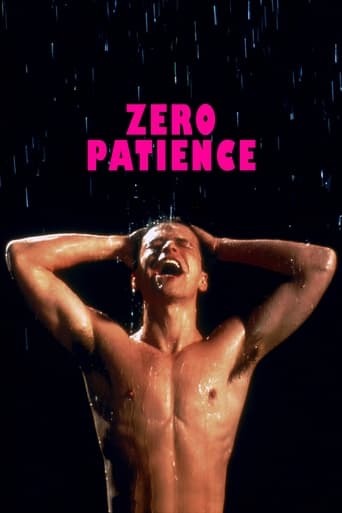

That was an excellent one.
... View MoreIt's fun, it's light, [but] it has a hard time when its tries to get heavy.
... View MoreI gave this film a 9 out of 10, because it was exactly what I expected it to be.
... View MoreIt isn't all that great, actually. Really cheesy and very predicable of how certain scenes are gonna turn play out. However, I guess that's the charm of it all, because I would consider this one of my guilty pleasures.
... View MoreA musical about AIDS (seriously) and it involves Patient Zero (the man who purportedly bought AIDS to the US) coming back from the dead (sort of) to clear his name.It took REAL courage to do this back in the early 1990s. AIDS was still a death warrant back then. You got it and you died--that was it. Thankfully things have changed now. This is NOT a good movie. It looks like it was made on no budget, the acting and singing are atrocious, the story goes all over the place and (by the end) I was lost and frustrated. It starts off OK but just quickly falls apart. There's a LOT of preaching about AIDS and how it came about...but none of it is even remotely interesting. The songs are pretty lame. They try to be amusing but fail miserably.I caught this back in 1995 at a college theatre (the chain theatres wouldn't touch it) and was completely unimpressed. So it gets a 3 for having courage but it really is pretty bad.
... View MoreFilm Critic DELIVERED with stinging irony, that lyric is meant as a blanket indictment of empiricism, and of our abiding need to "classify and label," to "banish every doubt." Why? Because a label is a tool that can double as a weapon - what identifies and separates can also isolate and stigmatize. How, then, to describe Zero Patience without falling into the empiricist's, and the critic's, taxonomical traps? A "movie musical about AIDS" is a popular answer - one that's odd enough to be enticing, vague enough to be innocuous. But it doesn't begin to sound the depths of a work that is intriguing, provoking, amusing, offending, demanding, inordinately intelligent, and defiantly resistant of the very thing I'm paid to do.So let's approach the picture from another angle, from the perspective of writer/director John Greyson. Now Greyson, unlike some artists who happen to be gay, would probably agree that there is indeed a definable "gay culture," an esthetic that goes heavy on irony and camp and outrageous humour and unapologetic theatricality. Clearly, all these ingredients are abundantly evident here. Just as clearly, Greyson (whose background lies in - get ready for a label - experimental video) has positioned his film at a 180-degree remove from a piece like Philadelphia. That movie, a drama about AIDS with a gay protagonist, was the product of mainstream Hollywood culture (unironic, non-outrageous, linear in plot and design), and took enormous pains not to offend a mainstream audience. This one is the product of a gay culture and doesn't give a damn who it offends. This one is smarter and more subtle, but lacks the emotional punch of the other (linear directness has its rewards), and the attendant complexities are hard to grasp at a single sitting.Perhaps this will help a little: Greyson has reincarnated the Victorian explorer Richard Burton (John Robinson), using him to symbolize the dangers inherent in the empirical approach still taken by the scientific community toward all issues, including the AIDS plague. Burton, who toils in a Natural History Museum, is intent on mounting an exhibit called The Hall of Contagion, with AIDS as the sexy centrepiece. Just as his explorer colleagues once tracked the source of the Nile, he hopes to trace the "cause" of this disease. Causation, of course, is a first principle among empiricists. Rationally, if you find the cause, you may find the solution. Ethically, alas, it's a different matter; there, if you find the cause, you can point the finger - you can affix blame, you can isolate and stigmatize.Enter another reincarnated soul, a gay ghost known as Patient Zero (Normand Fauteux) - the flight attendant who, in books like Randy Shilts' And The Band Played On, is "blamed" for first bringing AIDS to North America. Much of the film unfolds as an ongoing dialectic between the attitudes embodied in Burton and Zero, between serving a false cause and serving as a false villain. However, the dialectic takes the form of a literal song and dance - zippy production numbers where Glenn Schellenberg's toe-tapping melodies are laid over Greyson's thought- provoking lyrics. Consequently, the decorative fun on the surface (watch, if you dare, for an eye-popping ditty entitled The Butthole Duet) simultaneously competes with and complements the seriousness beneath - it's like tossing a colourful AIDS quilt over a dying AIDS patient. Greyson has refined and desentimentalized that most difficult of genres, the musical tragedy, and with every succeeding tune, he exponentially advances his thesis - other potentially false causes, like the "African Green Monkey" theory, like the HIV virus itself, come under his fire, as does everything from greedy drug companies to grousing AIDS activists. The film spares no one because, well, the disease spares no one.Philadelphia is American in origin, Zero Patience is Canadian. Each is splendid in its own way, and each reflects the best of the culture (and the industry) that gave rise to it. The former is conventional, straightforward, and all about certainty, including the certainty of death. The latter is quirky, complicated, and all about uncertainty, especially the uncertainty of life. Greyson, and the film he's made, are brave enough to question incessantly, and smart enough to know that "HIV- positive" is a lot more than a medical label - it's a cruel oxymoron. He has zero patience for the blustering apostles of science and even art, and (the ironies abound) has more in common with another eminent Victorian than he might care to admit. Mister Greyson, meet Mister Tennyson: "There lives more faith in honest doubt,/ Believe me, than in half the creeds." Benjamin Miller, Filmbay Editor.
... View More'Zero Patience' is a low-budget musical about the Aids crisis that actually treats the subject intelligently yet manages to be fun, light-hearted and optimistic. The film is targeted for an audience of gay males (or, at least, people who enjoy watching male nudity) but I liked it anyway.The title is a wordplay on Patient Zero -- the gay man who allegedly brought Aids to North America -- and the fact that people hoping for an Aids cure are tired of waiting: they've got zero patience. Near the climax of the film, Sir Richard Burton performs the title song with his friends: "What's the time?" "Zero Hour." "How much patience?" "None." Earlier, another song (performed by the titular patient) has a chorus in French that translates as "I know, I know, I know that I don't know." This Richard Burton is not the Welsh actor but rather the 19th-century explorer and linguist, who (according to this movie) stumbled into the Fountain of Youth and is still alive. (Played by an actor who looks nothing like the historic Sir Richard Burton.) I expected this movie's dialogue to mention that the real Sir Richard had himself circumcised in adulthood so that he could pass for an Arab in order to visit Mecca.I never fault any movie for having a low budget, but I do get annoyed when low-budget filmmakers try to tell a story that really requires higher production values. In 'Zero Patience', one musical number is performed aboard an airliner in flight: but there are only four passengers and one stewardess (Dianne Heatherington), so the nearly-empty cabin -- a set that would have impressed me in its own right -- looks ridiculous. Ironically, if they'd filled the set with more actors, they could have got away with a cheaper set.Similarly, at this film's climax, Burton and his friends attempt a civil disobedience ... but the action really cries for a crowd of rebels, not the handful shown here.I was also annoyed that this movie is so deeply in Political Correctness territory. We're not supposed to use the phrase 'Aids cases' because it's demeaning. We can't say 'Aids victims' or 'Aids patients' because that's judgmental. For a while, the accepted phrase was 'people with Aids' (PWA) but even that became taboo. Now we're required to say 'persons living with Aids', abbreviated as PLWA. During the airliner sequence, Heatherington identifies her employer as 'PLWA Airlines'. If she had said 'PWA Airlines', this would have been a clever and funny pun on TWA, a real airline. But she had to weaken the pun for the sake of political correctness, changing it to PLWA. This is the same sort of stupidity that makes me look a racist if I say 'coloured people' but I get credit for being enlightened if I say 'people of colour'.The cast of 'Zero Patience' -- some of them quite talented, others less so -- seem a bit too impressed with their own alleged audacity. Still, it took some guts to tackle this particular subject in this particular way. My rating: 4 out of 10, and here's hoping that 'Zero Patience' will become a period piece when Aids is curable.
... View MoreI always say that I don't have a favorite movie, but this is probably it. This is actually THE movie that made me fall in love with and get interested in all the following: movies, gay issues, AIDS issues, talented people (like John Greyson!). It's also the movie that brought me closest to believing in fate: I saw late one night when I was letting myself go to bed late for some reason, and the VCR just happened to be recording, and I really don't know why I didn't stop it, and it was by chance that the tape was long enough.... now if there is a destiny or anything like it, that's the closest there is to it! This movie is good, and so amazing, that I don't even know how I managed to write that stuff up there. Ignore all above. Just go watch this movie!!!
... View More